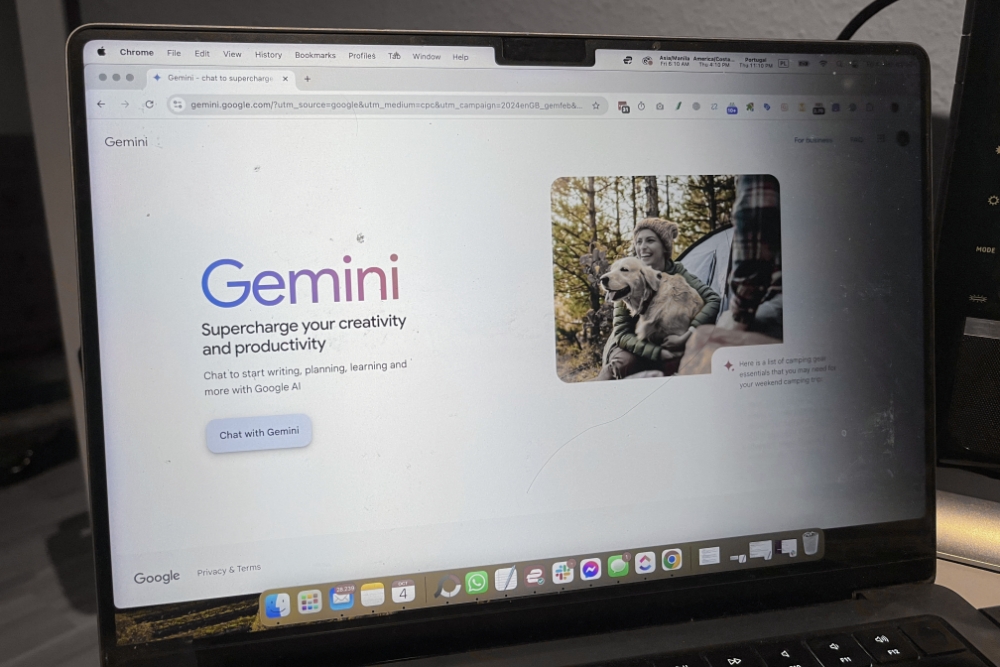
Google Bard (Now Gemini AI): Everything You Need to Know
AI has quickly become part of our everyday lives, from helping us with quick searches to assisting us with creative projects. If you’ve heard names like Google Bard, Gemini, or ChatGPT tossed around but aren’t quite sure what they mean, you’re in the right place! These AI tools are at the forefront of a tech revolution, transforming how we interact with computers, apps, and the web.
In this post, we’ll break down everything you need to know about Google Bard (now evolved into Gemini), its rival ChatGPT, and what all these AI platforms bring to the table. Whether you’re curious about their practical uses, interested in AI’s potential, or just want to stay ahead of the tech curve, keep reading—you’re about to get a crash course in the future of AI.
Table of Contents
What Is Google Bard?
First things first—Google Bard is Google’s AI chatbot that was developed to compete in the AI space against rivals like ChatGPT. Think of Bard as your digital assistant, ready to answer questions, help with tasks like writing and research, or even brainstorm ideas. Powered by one of Google’s large language models, Bard can understand and respond to a wide range of prompts in a way that feels natural and conversational.
But what makes Bard stand out? Well, it’s deeply integrated with Google Search, meaning it pulls information directly from the web to provide real-time, accurate answers. This is a big deal, especially when you’re looking for the most up-to-date information—something other AI chatbots like ChatGPT might struggle with since they rely on static data.
On top of that, Google Bard works seamlessly with Google apps and services like Gmail, Google Drive, and Google Calendar. So, whether you need help drafting an email, summarising a report, or scheduling a meeting, Bard is there to assist. It’s this tight integration with the Google ecosystem that sets Bard apart from other AI tools on the market.
The Evolution of Google Bard to Gemini AI
Recently, Google Bard has undergone an exciting transformation—say hello to Gemini AI. Yes, Google took Bard, revamped it, and released it as Gemini, a more advanced and powerful version of their AI chatbot. If you’ve been using Bard and noticed the name change, don’t worry; it’s essentially Bard 2.0, with bigger brains and better capabilities.
Why the rebranding? Well, Gemini represents Google’s next step in AI development, powered by the Gemini Pro AI model. It’s designed to tackle more complex problems, deliver even more accurate answers, and help users with creative tasks like writing and generating ideas. While Bard was already pretty good, Gemini AI takes things up a notch, making it even more useful for everything from research to content creation.
With Gemini, Google continues its AI journey, constantly pushing the boundaries of what AI chatbots can do. And just like Bard, Gemini is fully integrated with Google apps and Google Search, making it a seamless part of your workflow if you’re already using these tools.
Google Bard (Now Gemini) vs. ChatGPT: Who's Who in the AI World?
So, how does Google Bard (or Gemini) stack up against its biggest rival, ChatGPT? Let’s break it down.
ChatGPT, developed by OpenAI, is known for its intuitive conversation skills and broad knowledge base. It’s fantastic for creative writing, generating code, or brainstorming. However, because it’s trained on a static dataset, ChatGPT doesn’t always have access to real-time information. This can be a bit of a drawback if you’re looking for up-to-the-minute data, like the latest news or fresh research.
Google Bard (or Gemini), on the other hand, shines when it comes to pulling in real-time information. Thanks to its integration with Google Search, it can give you answers based on the most current information available on the web. So, if you’re trying to find the latest scientific discoveries—say, updates on the James Webb Space Telescope—Gemini will likely have the edge over ChatGPT in delivering accurate, up-to-date responses.
Another key difference is how each integrates with other tools. While ChatGPT is a fantastic standalone tool, Google Bard (now Gemini) works beautifully within the Google ecosystem. If you’re someone who lives in Google Workspace, constantly using Gmail, Google Drive, and Google Calendar, you’ll find Gemini extremely useful. You can ask it to draft emails, summarise documents, and even organise meetings—all within the same ecosystem.
So, if you’re looking for creativity and conversation, ChatGPT is great. But if you need real-time information and tight integration with Google’s apps, Gemini AI might just be your go-to.
Comparison Point | ChatGPT | Google Gemini (formerly Bard) |
Developer | OpenAI | |
Real-time Information | No (trained on static datasets) | Yes (integrated with Google Search) |
Integration with Apps | Limited (requires third-party tools) | Deep integration with Google apps (Gmail, Google Docs, etc.) |
Generative AI | Strong in creative tasks (writing, coding) | Advanced generative AI (content, images, summaries) |
Conversational AI | Excellent conversation capabilities | Improved with Gemini, built on Google’s AI technology |
Best For | Creative writing, coding assistance | Real-time information, research, productivity in Google ecosystem |
Key Features of Google Bard and Gemini AI
What makes Google Bard (now Gemini) such a powerful tool? Here are a few standout features:
- Seamless Integration with Google Apps: One of the biggest benefits of Google Bard and Gemini is how they integrate into Google Workspace. Need to draft an email in Gmail or create a meeting in Google Calendar? You can do that with just a few prompts. This makes Gemini incredibly useful if you’re already using Google’s suite of apps.
- Generative AI Capabilities: With the upgrade to Gemini AI, you get access to more advanced generative AI. This means you can ask it to generate content like summaries, creative writing, or even images. If you’re a content creator, marketer, or just someone who needs help writing, this is a game-changer.
- Real-Time Information: Unlike other AI chatbots, Gemini pulls data from Google Search, ensuring you always have access to the most current information. This is especially useful for time-sensitive tasks or research.
With these features, it’s no wonder that companies in the UK and beyond are embracing AI technology more than ever.
AI Growth and Adoption in the UK: Why It’s the Right Time to Embrace AI
Speaking of AI adoption, let’s look at some impressive stats coming out of the UK. The AI market in the UK is already worth more than £16.8 billion, and it’s expected to grow to a staggering £801.6 billion by 2035. That’s a massive leap!
Not only that, but the number of AI companies in the UK has increased by over 600% in the past 10 years. More and more businesses are turning to AI tools like Google Bard, Gemini, and ChatGPT to boost productivity, streamline processes, and improve efficiency.
Government research shows that around one in six UK organisations—about 432,000 companies—have already adopted at least one AI technology. And when you break it down by company size, the numbers are even more revealing: 68% of large companies, 33% of medium-sized companies, and 15% of small companies have incorporated AI into their operations.
Why? Because AI delivers real results. For instance, Marks & Spencer reported an 80% reduction in warehouse accidents after trialling AI-powered computer vision technology. Other popular AI solutions in the UK focus on data management and analysis, natural language processing, and machine learning.
The Future of AI with Google Gemini
So, what’s next for Google Bard and Gemini? Well, this is just the beginning. As AI adoption continues to rise—especially in sectors like IT and telecommunications (with an adoption rate of 29.5%)—Google is committed to further improving its AI tools. Expect more advanced versions of Gemini, like Gemini Ultra, which could take AI’s capabilities even further.
With AI becoming a central part of businesses across industries, from data analysis to natural language processing and image processing, we’ll likely see more innovative uses of AI tools like Gemini and ChatGPT. And with Google’s long history of using AI, you can bet they’ll continue to build reliable and trustworthy AI systems that push the boundaries of what’s possible.
How to Use Google Bard (Gemini) and Make It Work for You
Ready to dive in and start using Google Bard (or Gemini)? Here’s a quick guide to get you started:
- Access Gemini: If you were using Bard before, you’ll find that Gemini is available in all the same places—within Google Search, Google Assistant, and Google Workspace apps.
- Ask Complex Questions: Whether you’re doing research or need help drafting an article, Gemini can handle it. Just type your question or request, and let the AI work its magic.
- Use It Across Google Apps: If you’re already using Gmail, Google Drive, or Google Calendar, you’ll love how Gemini AI integrates with these tools. Ask it to help you schedule, write, or summarise with just a few prompts.
Wrapping Up
Google Bard (now Gemini AI) is leading the charge in the AI revolution, and with the UK’s AI market booming, there’s never been a better time to get on board. Whether you’re looking for a tool that integrates with your favourite Google apps, need access to real-time data from Google Search, or want to harness AI in digital marketing for more targeted strategies, Gemini offers a powerful, intuitive solution.
And while ChatGPT shines in creative tasks, Gemini is your go-to for productivity, research, and up-to-the-minute information. Give it a try, and you might just find that AI becomes your new favourite assistant—whether you’re in the office or at home.
